Encyclopedia of Anti-Revisionism On-Line
Anti-Revisionism in the United Kingdom
The First Wave of Anti-Revisionism: The Early 1960s – Index Page
The 1960 publication of Long Live Leninism by the Communist Party of China gave impetus and focus to the inner-party opposition to the revisionist course of the Communist Party of Great Britain. That opposition further crystallised with the exchange of polemics on the general line of the International Communist Movement among the Soviet, Chinese and Albanian Parties in the early 1960s as the political stance that would later be termed “anti-revisionism” began as a call for the return to Leninist orthodoxy. Anti-revisionists within the CPGB saw in the arguments advanced by the ruling Albanian and Chinese parties as reaffirmations of their own criticisms of the British Road to Socialism and the CPGB leadership.
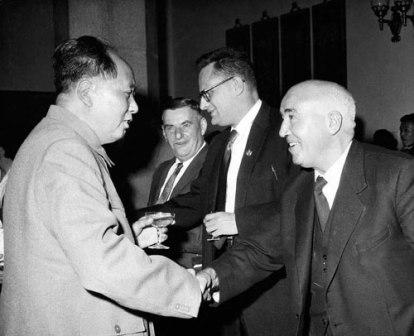
Thus, it was the open disagreements within the international communist movement that sparked a concerted and co-ordinated attempt by CPGB members to challenge the political line and leadership of the Party. Oppositionist Party members began to organise amongst themselves, drawing anti-revisionist members together on a common platform as the long period of disenchantment with the direction that the Party had been travelling saw, in the early 1960s, the emergence of a wave of anti-revisionist activism that, this time, found both political and organisational expression.
November 10, 1963 provides a convenient date for the birth of the organized anti-revisionist movement in Britain when a meeting of communists at the Lucas Arms public house debated the best way to combat revisionism. The meeting was divided on the apparently tactical issue of whether the struggle should be carried out openly or clandestinely within the Communist Party of Great Britain.
As a result, two organisations emerged in opposition to The British Road to Socialism: an open group – the Committee to defeat Revisionism for Communist unity (CDRCU) and a clandestine inner-Party opposition grouping, FORUM for Marxist-Leninist struggle.
The CDRCU, led by Michael McCreery, was active from February 1964 through February 1965, during which cells were established in several cities and a number of public meetings arranged. CDRCU began publishing a newspaper, Vanguard, in 1963. However, McCreery death in 1965 (in New Zealand) saw the activity of the group decline sharply.
FORUM, on the other hand, provided a platform for those who would not agree with an open break with the CPGB. Its duplicated bulletin circulated critical articles inside and outside the Party. The clandestine nature of its opposition, however, limited its effectiveness.

Although the continuing international stand taken by the Albanian and Chinese parties helped to crystallise the views of those members of the CPGB who wanted to struggle against the manifestation of revisionism in Britain, the numbers of participants in the anti-revisionist struggle within the CPGB and those outside or expelled from the Party were never that numerous, and suffered from not being united in a single organisation.
These initial networks of dissidents which emerged within the Communist Party shared a number of important characteristics: they were mainly cadre groups which were small, politically isolated, and sectarian in their near exclusive focus on struggles with the existing revisionist organisation (CPGB).
By the end of 1967, the vast majority of these initial anti-revisionists had left or been expelled from the CPGB, with many of them moving into a variety of new, overtly Maoist groups that emerged from the wreckage of the CDRCU following McCreery’s death in 1965. The Action Centre for Marxist-Leninist Unity, associated with Mike Baker and Bill Bland, published Hammer and Anvil. This grouping became the Marxist Leninist Organisation of Britain in September 1967. It achieved some notoriety in January 1968 with the publication of a critical report on the Cultural Revolution that came out in support of Liu Shaoqi and against Mao. This demarcation from Mao Zedong disqualified the organization as “Maoist”, although Bill Bland, a major contributor to the report, thought that Enver Hoxha was still a Marxist. Bland maintained a pro-Albanian stance until his death in 2001.
Other Maoist groups that arose in this first period include the following. In London, the Working People’s Party of England emerged in 1968 out of the London Workers Committee led by Paul Noone, a founding member of the Junior Hospital Doctors’ Association. It published the London Workers’ Broadsheet. In May 1966 the Workers’ Party of Scotland was established with seven founding members, formerly of the Scottish committee of the CDRCU. It campaigned for Scottish Independence.
Contents
General Background Materials
The Family Tree of the Anti-Revisionist Movement in the UK [Chart]
The Rise and Fall of Maoism: the English Experience by Sam Richards
Sharpening of Ideological Battle in Britain by George Thomson
Marxism in China Today by George Thomson
A short guide to Maoists in Britain
Notes Towards A History: As It Was At The Beginning
Maoism in Britain – Is this the End? by Harry Powell
Memoirs
Opposition Inside the Party [Chapter 6 from What’s Left? What’s Right?, by Muriel Seltman]
The Sino-Soviet Dispute and Expulsion [Chapter 7 from What’s Left? What’s Right?, by Muriel Seltman]
The 1960s [Chapters 22-25 from A Red Square. The Autobiography of an Unconventional Revolutionary, by William Ash]
Debates within the CPGB in the Period Before the Birth of UK Anti-Revisionism
The Moscow Conference by John Gollan [Marxism Today, January 1961]
The Fight Against Monopolies by Michael McCreery [Marxism Today, December 1962]
Executive Committee Statements on: The International Communist Movement by the Communist Party of Great Britain
Philosophical Revisionism by William Ash [Marxism Today, July 1963]
Problems of the International Communist Movement by R. Palme Dutt [Marxism Today, September 1963]
Peaceful Coexistence–Burning Issue of Our Time by James Klugmann [Marxism Today, October 1963]
National Liberation Today by R. Palme Dutt [Marxism Today, January 1964]
The Attack Upon the Party [CPGB] From the So-called “Extreme Left” (Extract)
Which Road? by John Gollan [Marxism Today, July 1964]
Peaceful Coexistence by Patricia Davies and David Crook [Marxism Today, July 1964]
A Rejoinder by James Klugmann [Marxism Today, July 1964]
In Defence of Stalin: Discussion Notes by a British Worker
Committee to Defeat Revisionism For Communist Unity

An Appeal to All Communists from Members of the CPGB was issued from the Lucas Arms meeting in November 1963 in the name of The Committee to Defeat Revisionism, for Communist Unity (CDRCU) led by Michael McCreery. It called for all “to unite around the principles of the 1960 Statement of the International Communist Movement”. Expulsion from the party inevitably followed their public stance.
The short-lived organisation did grow throughout its fifteen months existence, providing a political testing bed for many activists who were to remain within the movement in Maoism’s second wave in Britain. The publication (and selling) of the Vanguard newspaper and pamphlets, a flurry of lectures and political discussions, the attempt to accumulate revolutionaries and heckling of the revisionist Party meetings were part of the early days of establishing a political profile.
Undoubtedly the effectiveness of the anti-revisionist resistance was lessened by its divided nature inside, and outside the Communist Party. But that was a fact of life that McCreery and others in the CDRCU were attempting to overcome. As its activities developed, the CDRCU was gaining acceptance internationally: Vanguard carried a picture of McCreery with the Albanian leader, Enver Hoxha. The following message was printed – “I wish you ever success in your very noble struggle against imperialism and modern revisionism for the unity of Marxist-Leninist Communists in your country, for the triumph of peace, freedom and democracy and socialism in the world.”
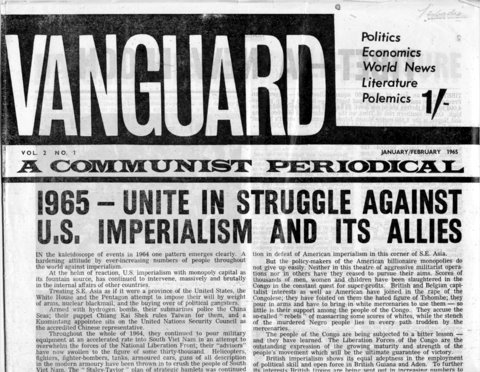
The constituent groups of the CDRCU consisted mainly of expelled Communist Party branches or sections of branches and other members in Scotland, Wales, Yorkshire, South Lancashire, West Country, Home Counties and London. Other prominent members of the CDRCU included Johnny James, the expelled London District Committee member from Stoke Newington, who later associated with WPPE (Working Peoples’ Party of England) and better known for his role in the radicalisation of CARD (Campaign Against Racial Discrimination). Vanguard carried a statement in solidarity with James from the Stoke Newington CP branch, with 14 signatories,(all to be expelled from the CPGB) associating themselves “with the principled stand” and “fundamentally correct Appeal to All Communists” stating the leadership had substituted insults for serious political discussion, indulged in “vulgar lies” “damaging slanders” and “scurrilous practice”.
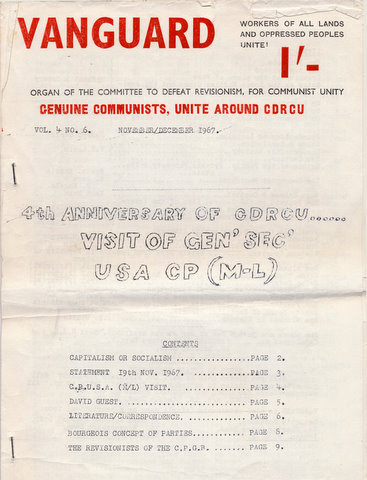
Whilst the CDRCU did mark a new stage in the development of Marxist-Leninist politics in Britain, the failure to sustain its existence after Mcreery’s departure points to major weaknesses in its political life that was not simply a financial dependency but a political reliance. The CDRCU was heavily criticised as opportunist and adventurism by those anti-revisionists who tried to remain within the Communist Party. There were very strong personal animosities behind the political charges. Its quick collapse after McCreery’s death in April 1965, as the organisation’s secretary, Mike Baker concluded, shows “...important weaknesses were also present in the political framework and organisational structure of the CDRCU. In particular, the failure to establish correct organisational methods of work.”
Background Materials
’The Outside Left’ [Chapter 7 in The British Political Fringe by George Thayer]
In Memorium.....Michael McCreery
Michael McCreery, the WPPE and the break with Reformist ’Communism’ by Paul Noone
Michael McCreery, The Workers Party of Scotland and the Communist Federation of Britain by Paul Noone
Primary Documents
An Appeal to All Communists
Destroy the Old to Build the New! by Michael McCreery
The C.P.G.B. and Trade Unions by A. O’Neill
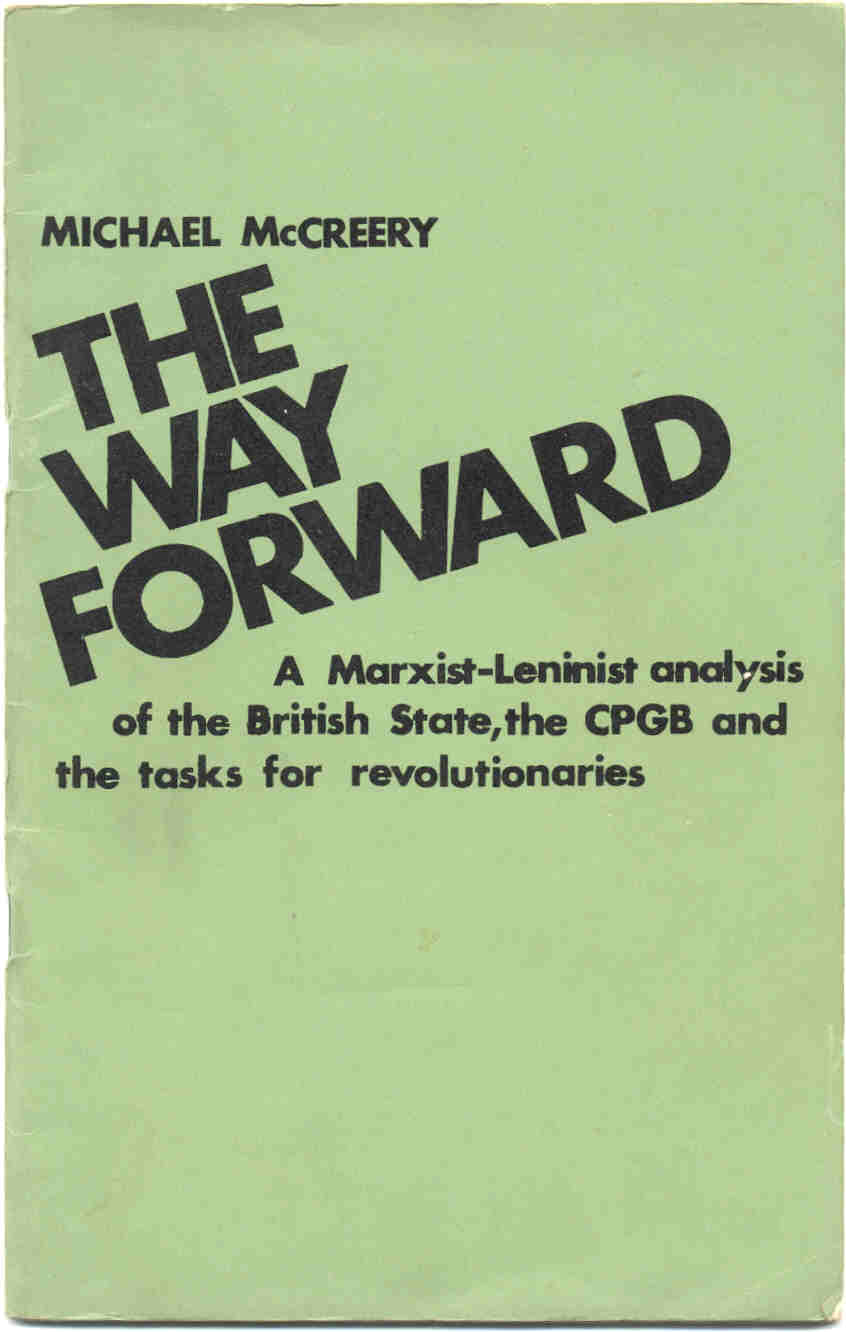
Against the Enemy by A. H. Evans
The Way Forward – The need to establish a Communist Party in England, Scotland and Wales by Michael McCreery
Organise at the Place of Work by Michael McCreery
Notes on the Lower Middle Class and the Semi-Proletariat in Britain by Michael McCreery
On N. Khrushchov, Fertiliser, and the Future of Soviet Agriculture by A. H. Evans
Why The Attack On Stalin by Dave Volpe
The Immediate Task
The National Question in Britain by Michael McCreery
Origins of the British State by Michael McCreery
Unity of the Left by Roy Grant
Unite Against Racism!
Statement: Leeds-Bradford
What’s wrong with Peter Seltman? by A. H. Evans
CDRCU Policy Statement of September, 1966
The Way Forward Once More
Modern Literary Revisionism and the Chinese Cultural Revolution by A. H. Evans
What's New? [On The Action Centre for Marxist-Leninist Unity]
The National Problem in the Light of the Teachings of Lenin and Mao Tse-Tung by A. H. Evans
A Question of Definition: Anti-Revisionists and Marxist-Leninists
Visit to Europe of General Secretary of C.P. U.S.A. (Marxist-Leninist)
’Red Front’ truly a ’front’ of reaction
[Back to top]
Forum
Forum emerged in the early 1960s and provided a platform for those who did not agree with an open break with the Communist Party. Its duplicated bulletin circulated critical articles inside and outside the Party. It preserved the anonymity of its supporters to “oppose revisionism in Britain as part of the international struggle for correct Marxist-Leninist policies and revolution”. The clandestine nature of its opposition meant it was isolated by the Party machinery, dependent on personal networks and unable to recruit fellow dissident anti-revisionists in an open political fight. It was hostile to Michael McCreery and the CDRCU’s political perspective of party building and associated with the anti-revisionist London Political Organisation. As the grip of Party discipline throttled the opportunity for Forum’s supporters to operate within the organisation, there was a shift towards new anti-revisionist projects such as The Marxist and proliferation of more overtly Maoist groups that made up the second wave of anti-revisionist activism in the latter half of the sixties.
Primary Documents
The Source of Opportunism in the working class movement (Part 1)

The Source of Opportunism in the working class movement (Part 2)
Why Anonymity?
Attention Marxist-Leninists in Britain!
Defend the International Communist Movement
R.P. Dutt – an arch enemy of the masses
More on Dutt, the Arch Enemy
The National Liberation Movement Today as Seen by Dutt, Krushchev and Others
On Unity of Marxist-Leninists
On the Formation of a Marxist-Leninist Party
FORUM Supplement: Peaceful Co-Existence and the Class Struggle: Remarks on the article by George Matthews in “Comment” No. 3, May 2nd 1964
The Party Can Be Transformed
The Road to Nowhere
Clarification
FORUM – “Purpose”
Three Contributions of Mao Tse-Tung to Marxism seen in relation to the situation in Britain 1965
The Communist Party and Labour
[Back to top]
The Marxist
If you were a member of the London district of the Communist Party in 1967, you would have been shown a letter at branch meetings and be expected to sign that it had been read and that you approved it. The statement condemned The Marxist as a “disruptive little sect who have emerged to claim a virtual monopoly of Marxist understanding. Like all sectarian groups, they want the movement to go back to square one and start anew under their leadership.”
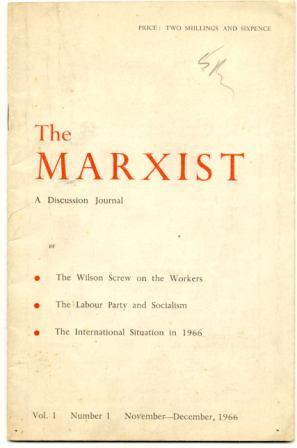
The Marxist, in reply, called for study and debate of the issues involved. There was not much chance of that: the party machine invoked inquisitional committees of inquiry and applied the pressure of party loyalty to sustain wavers’ organisational allegiance. By the time the first issue of The Marxist appeared in November 1966, the line of the Communist Party had been firmly aligned in the November 1965 Executive Committee statement:
“Our Chinese comrades are attempting to repudiate some of the most important new and correct developments which have occurred in the last few years in the international communist movement.”
Those around the journal could not be dismissed lightly for they had a proven record of Party service. The first editorial board included a recent member of the Party’s Executive Committee, trade union leader Reg Birch; Tom Hill, member since 1945 and an AEU convenor of shop stewards; Colin Penn, well known architect and party member since 1938; Jim Kean, engineer worker and party member since 1949, Mike Faulkner, a YCL member since 1956 who served on the party’s National student Committee; Ewan MacColl, a long time-Party cultural worker. Yet The Marxist itself was seen with some suspicion over its “bourgeois backing” (the financial support of business people long associated with trade with China).
Those around The Marxist repeated the same error as the earlier inner-party opposition associated with FORUM; was it a “collective organiser” to be a British Iskra and build a movement, or a journal of analysis and discussion (an anti-revisionist journal unaligned to any specific group). In the absence of a political strategy, divisions emerged within the year as Reg Birch and supporters were involved in their own political strategy of creating a new communist party. On the important matter of the way forward, the dominant view was one that foresaw the unity of groups coming out of engaging in practice together. The Editorial Board of the journal, by 1968 was dominated by the Brent Workers Association, which was associated with Tom Hill and Frank Huscroft, and did work, for six brief months, within the newly formed Joint Committee of Communists – a response to the creation of the Communist Party of Britain (Marxist-Leninist) founded by Reg Birch.
With that its contribution to rebuilding the revolutionary movement came to an effective end. When it did surface again within the movement it was regarded as on the national chauvinistic side of the arguments calling for “import controls” to aid the restructuring of industry in 1981 and supported the national defence line in the arguments over the “Three Worlds Theory”. The Marxist remained the publication of the renamed Brent Marxist Industrial Group based on a nucleus of North London engineering workers, through organisational name changes – the Marxist Industrial Group and The Marxist Publications. At the beginning of the 21st century the journal acquired an Internet presence but by 2014 it appears to have become inactive.
Background Materials
“THE MARXIST:” A statement by the London District Secretary of the Communist Party
Our Reply [to the statement by the London District Secretary of the Communist Party]
Primary Documents
Our Purpose
The Labour Party and Socialism by Mike Faulkner
From Camden Communist Youth Movement
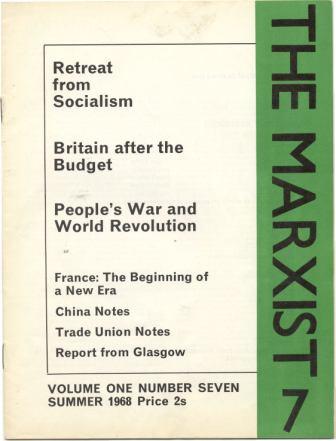
Editorial Comment: Back To Square One?
China 1968 by Colin Penn
Teaching by Negative Example by James Wood
People’s War and the World Revolution by Mike Faulkner
Report from the Glasgow Communist Movement
The Vietnam Movement: Report from Glasgow Communist Movement and South West London Marxist-Leninist Group
From Prague to Chenpao. An Editorial Statement On Soviet Aggression
Lessons of the Cultural Revolution: The working class must lead in everything by Jack Bradley
School’s Action Union
The national question and the struggle for socialism in Britain – A statement by the Glasgow Communist Movement
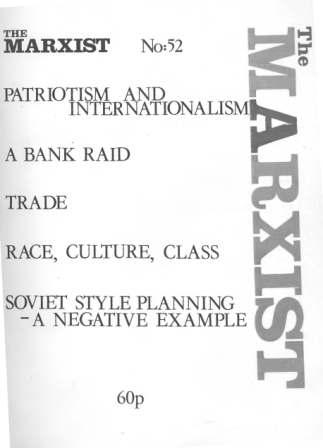
Debate on Parliamentary Elections: ’As a rope supports a hanging man...’ Dick Jones puts his view
Why We Won’t Vote Labour. A Reply to Dick Jones by the Brent Marxist Industrial Group
Nationalism and the Proletarian Revolution by C. K. Maisels
Marxism-Leninism and Parliamentarism by Sean McConville
Letter from Hilda and Edward Upward
Reply to Correspondence
Chile. The peaceful road to slaughter by M. Hickey
Patriotism, National Sovereignty and the Superpowers by the Brent Marxist Industrial Group
’Industry First Campaign’ leaflet
End of an Era [No. 46, August 1991]
What Went Wrong? [No. 51, March 1994]
Race, Culture, Class [No. 52, November 1994]
Patriotism and Internationalism [No. 52, November 1994]
Periodical
Selected Issues of The Marxist
[Back to top]
Action Centre for Marxist-Leninist Unity – Marxist-Leninist Organization of Britain

After the death of Michael McCreery, the Committee to Defeat Revisionism For Communist Unity rapidly went into decline. In September 1965, a majority of the CDRCU members regrouped at a Conference in Manchester and established the Action Centre for Marxist-Leninist Unity. Mike Baker, who had been a close comrade of McCreery and a member of the Central Committee of the CDRCU, was elected Secretary and editor of its official organ, Hammer or Anvil.
Between May and September 1967 the ACMLU initiated the Preparatory Committee for a Conference of Marxist-Leninist Unity and, subsequently, the Conference of Marxist-Leninist Unity which culminated in the formation of the Marxist-Leninist Organization of Britain. The MLOB published the journals Red Front and Red Vanguard (later renamed Class Against Class). The Secretary of the MLOB was also Mike Baker.
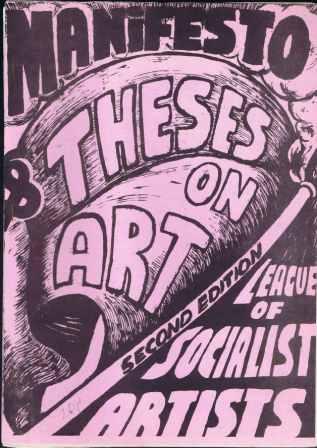
In addition to his activities in the MLOB, Mike Baker and other members of the group were active in the early 1970s in the League of Socialist Artists (LSA) which was dedicated to “Marxist-Leninist proletarian art” in the service of the working class.
William B. (Bill) Bland was Chairman of the MLOB until 1974. Bland became associated with ACMLU while still a member of the CPGB. He contributed to Hammer or Anvil from its very first issue of November 1965 under the name of ’W. Steele’. In the period 1967 to 1974 Bill Bland drafted a number of reports for the MLOB, including on the cultural revolution in China, and on the ’centrist’ parties of North Korea, Vietnam, Cuba and the Communist Party of India (Marxist).
The 1968 Cultural Revolution report in particular gained considerable notoriety by siding with Liu Shaoqi against Mao as the true Marxist-Leninist. In this, the MLOB was similar to a number of other European anti-revisionists who could not accept the Maoist critique of Liu, including Jacques Grippa in Belgium and the Centre marxiste-léniniste de France.
The MLOB underwent a split in 1974, culminating in the expulsion of Mike Baker. The Baker group soon became inactive. The remainder of the organization, under the leadership of Bill Bland, changed its name to the Communist League.
Background Historical Materials and Polemics
Letter from ACMLU to Communist Party of Belgium (Marxist-Leninist)
What’s New? [On The Action Centre for Marxist-Leninist Unity] by the Committee to Defeat Revisionism, for Communist Unity
’Red Front’ truly a ’front’ of reaction by the Vanguard
Topics for Discussion: MLOB & MLOUSA by the Marxist-Leninist Organization of the U.S.A.
Statement on the Expulsion of Mike Baker
Memorandum To Comrades VS & JM (India). From the Newly Formed Communist League following the Expulsion of Mike Baker & the split in the then Marxist-Leninist Organisation of Britain by William B. Bland
Interview with William B. Bland
Primary Documents
Classes in Modern Britain by W. B. Bland
Conference lays foundation of Marxist-Leninist Party
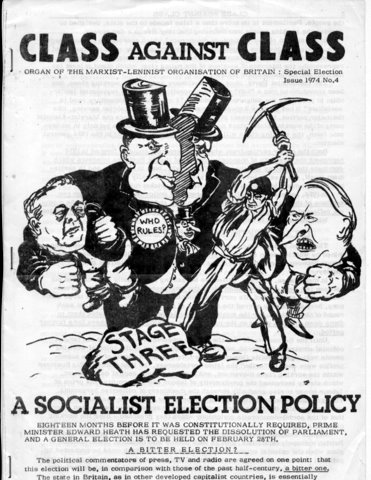
AIMS of the Marxist-Leninist Organisation of Britain
The Arsenal of Revolution
The Traitors of King Street
Report of the Central Committee of the M.L.O.B. on the Situation in the People’s Republic of China
Proletarian Internationalism: The Key to Victory in Anti-imperialist Struggle and Socialist Revolution!
A Call for Workingclass United Action [leaflet]
Report of the Discussion Forum on People’s China: “The M.L.O.B. Replies to its Critics”
Report of the Central Committee of the M.L.O.B. on the Role of “Centrist” Revisionism
The Theory of the Guerrilla Elite. An analysis of the theories of Regis Debray as propounded in “Revolution in the Revolution” and their relevance to the revolutionary struggle in Latin America from Red Vanguard No. 1 (Spring 1970)]
An Open Letter to the Rank and File of Maoist Parties, Organizations and Groups
Report of the Central Committee of the M.L.O.B. on the Origins of Modern Revisionism
Report of the Central Committee of the M.L.O.B. on the Pakistani Revolution
Manifesto and Theses on Art by the League of Socialist Artists

A New Comintern Marxist-Leninist Is Being Born! by the Marxist-Leninist Organisation of Britain, Marxist-Leninist Organization of Germany and Marxist-Leninist Organization of the U.S.A.
Chile: The “Peaceful” Road to Counter-Revolution by the Red Front Movement
What Is To Be Done Now? The Relevance of Lenin’s “What Is To Be Done?” to the Development of a Revolutionary Marxist-Leninist Party in Britain
The “Appeal Group”
War Has Come Once Again to the Middle East
Watergate: The Unmaking of the President
A Socialist Election Policy
The Carve-Up of Cyprus
A New Surface on the British Road by W. B. Bland
Ten Years On... From Revolution through Counter-Revolution to the Consolidated Rule of the National Capitalist Class in China
[Back to top]
Working People’s Party of England
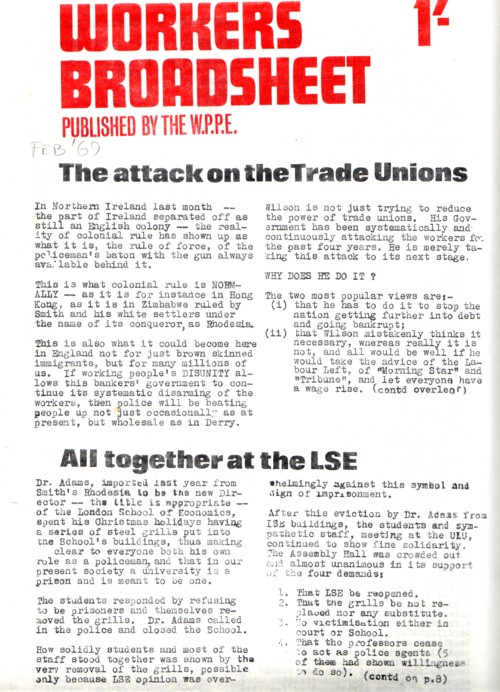
The Working People’s Party of England (WPPE) was created by former members of the Committee to Defeat Revisionism for Communist Unity. Beginning from a group in Islington called the Islington Workers’ Committee, in 1966 it became the London Workers’ Committee and began publication of the London Workers’ Broadsheet. In May 1968, the Working People’s Party of England was founded.
The party was led by Paul Noone, a prominent member of the small Medical Practitioners Union. It developed links with the Workers’ Party of Scotland (Marxist-Leninist), but suffered a split when a section of members left to form the Committee for a Socialist Programme.
In 1975, the WPPE began publishing the Workers’ Newsletter. In 1980, it renamed itself the Workers’ Newsletter Group, and in 1985, it again changed its name, to the Workers’ Association. The organization appears to have disbanded in 1986.
Polemics
Criticism of the Programme of the W.P.P.E. by the Communist Federation of Britain (M-L)
Letter from Workers Broadsheet and Editor’s Reply
Primary Documents
In Memory of Michael McCreery
Programme for the Working Peoples Party of England
Get Organized – For Power
Michael McCreery, the WPPE and the break with Reformist ’Communism’ by Paul Noone
Michael McCreery, The Workers Party of Scotland and the Communist Federation of Britain by Paul Noone
Unity of What....For What? A comment by WPPE on the current search for a basis for Marxist-Leninist unity in the UK
The Labour Party: Vehicle for Socialism? by the Workers Newsletter Group and Coventry Workers Association
[Back to top]
Workers’ Party of Scotland (Marxist-Leninist)
The WPS (ML) had its origins in the Committee to Defeat Revisionism For Communist Unity. Arguing that the level of class antagonisms (and hence class consciousness) continued to remain higher in Scotland than in England, the decision in principle to form the WPS (ML) on the behalf of the Scottish working class was taken in Edinburgh in May 1966 by seven anti-revisionist veterans. Thus, the Scottish elements of the CDRCU were placed on a separate organisational basis. The Scottish Vanguard, the organ of the WPS (ML), was launched in 1967.
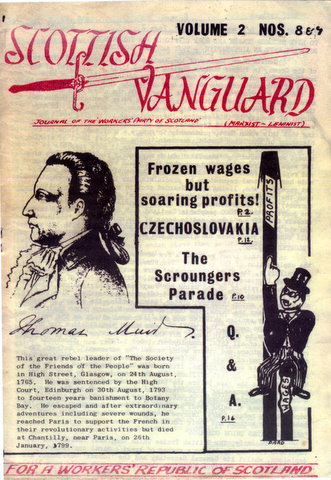
The constitution of the WPS (ML) was adopted in Edinburgh on December 5th 1970, in the wake of the CDRCU collapse. The Party stated: “our programme is one of action. We must secure the results which our workers have been striving to attain for whole generations and which are still outside their grasp: full employment and prosperity for all, a crash programme to solve the housing problem, justice for the veterans of labour and attractive prospects in Scotland for our youth.” The WPS (ML)’s support for Scottish nationalism and independence drew sharp criticism from other anti-revisionist groups.
The WPS (ML) soon embarked upon a propaganda offensive producing leaflets and the Red Clysider, and Dundee and Tayside Vanguard in 1971. A Bookshop, Vanguard Books, in Glasgow acted as outlets for Marxist and Party literature. The WPS (ML) was also instrumental in popularising the work of Scottish communist, John MacLean, partly through the founding of the John MacLean Society.
Ken Houlison and Val Sutherland had been the initial leaders of the WPS (ML) but Tom Murray, for many years, the Party Chairman, sustained the organisation’s existence beyond its actual effective operation. Aberdonian by birth, Murray was veteran communist, having served as political commissioner of a machine gun battalion in the Spanish Civil War.
The WPS (ML) achieved notoriety in the spring of 1972 when two members – Colin Lawson and Matt Lygate – and non-party persons were sentenced for robbery with violence of Glasgow banks to obtain money for political action. While protesting at the severity of the sentences, and noting the political function of the judiciary, the main thrust of a statement issued by the WPS’s Central Committee “A Crisis Met and Overcome” was to disassociate the Party from the “romantic adventurism” of Lygate and Lawson.
Membership of the WPS (ML) declined in the late 1970s and early 1980s, particularly after the death of Tom Murray in February 1983. However, the Party was revived by Matt Lygate after his release from prison. It went on to initiate in Glasgow’s Maryhill what became the anti-poll tax movement in Scotland, which helped spark mass resistance throughout Britain to Margaret Thatcher’s Tory government.
Background Materials
STATEMENT: The Committee To Defeat Revisionism For Communist Unity and the Workers’ Party of Scotland
National Socialism: On the So-called “Workers’ Party of Scotland (M.L.)”
The national question and the struggle for socialism in Britain – A statement by the Glasgow Communist Movement
Nationalism and the Proletarian Revolution by C. K. Maisels
Proletarian Soldier: A personal tribute [to Tom Murray] by Steve Fullerton
Primary Documents
The Manifesto of the Workers’ Party of Scotland (Marxist-Leninist) [1967]
The Struggle Between ’Two Roads’ in Scotland
Patriotism, Nationalism, Internationalism, Revolution Questions answered by Matt Lygate
Czechoslovakia – Soviet Revisionism
The Manifesto of the Workers’ Party of Scotland (Marxist-Leninist) [1970]
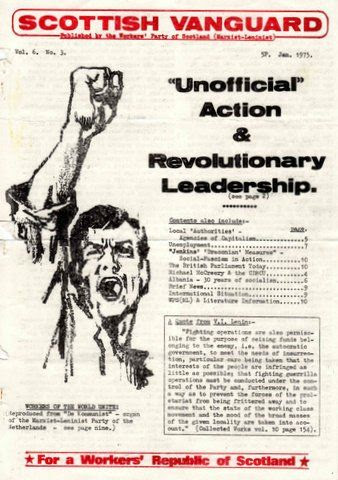
Old Enemies – Old Mistakes!
A Crisis Met and Overcome
Ireland – Our Tasks by the Central Committee of the Workers’ Party of Scotland (Marxist-Leninist)
The 10th Anniversary of the Workers’ Party of Scotland (ML) by Tom Murray
On the Birmingham Conference, July (1977)
Draft Organisational Line for Marxist-Leninist Consultative Meeting Proposed by the Workers’ Party of Scotland (Marxist-Leninist) and the Revolutionary Marxist-Leninist Communist League of Britain
Joint Communique of 15th July, 1978 issued by the Workers’ Party of Scotland (Marxist-Leninist) and the Revolutionary Marxist-Leninist Communist League of Britain
Report: Interim Committee Consultative Meeting for Marxist-Leninist Unity, 9-10 September 1978
Democratic Defence [Leaflet]
Periodicals
The Scottish Vanguard
Red Clydesider, Vol. 1, No. 1, January, 1971
Red Clydesider, Vol. 1, No. 4, 1971
[Back to top]
Communist Workers Organization and the Irish Communist Organization
The Communist Workers Organization was the British section of the Irish Communist Organization, (ICO) an anti-revisionist group formed by Irish emigrants, with a contact addresses in north London. The history of the ICO itself is inseparable from that of these Irishmen, Brendan Clifford.

Like a number of other Irish émigrés in London in the early 1960’s, Clifford left the Communist Party of Great Britain and joined Michael McCreey’s Committee to Defeat Revisionism for Communist Unity (CDRCU).
At the behest of the CDRCU, Clifford began to organize an Irish sub-section intended to compete with the Communist Party influenced Connolly Association and perhaps lay the basis for a Marxist-Leninist group in Ireland. But by May 1964, Clifford broke with the CDRCU and in conjunction with Irish Trotskyites, formed the Irish Communist Group (ICG).
In the autumn of 1965, the ICG split into Trotskyite and anti-Trotskyist factions. Clifford and others endorsed the anti-Trotskyist position and formed the Irish Communist Organization in November 1965. The ICO’s London section appeared soon thereafter and formed a part of the city’s anti-revisionist current, publishing the first issue of “The Communist” in March 1967 and engaging in discussions and activities in London’s vibrant student-fueled Marxist-Leninist scene, including initiating a meeting with the leadership of the Communist Federation of Britain (ML) in November 1970.
The group also began to publish detailed critiques of ’revisionism’ in Ireland and elsewhere. It generally took a pro-Chinese and Albanian position in international politics. However it also placed itself in the Irish radical tradition and reissued forgotten or unavailable articles by James Connolly and Liam Mellows (as well as a reprint of Roddy Connolly’s report (to the Comintern) on the two sides in the Irish Civil War).
Despite its international line, the ICO was never a “Maoist” group; its views were largely motivated by a defense of Stalin and the Soviet experience. In fact, the ICO undertook an investigation into the development of Maoism, and concluded that it was not a suitable model for an anti-revisionist group because, it claimed, Mao had supported the development of Khrushchev’s “revisionism”.
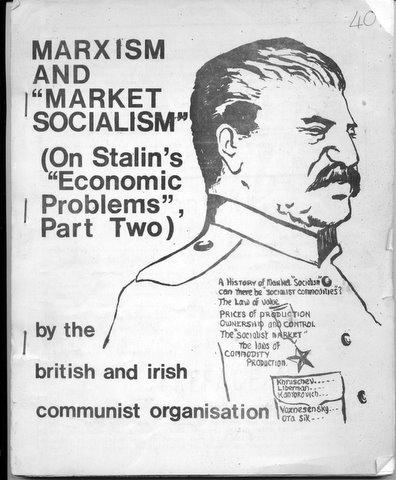
In the late 1960’s the ICO began to formulate a view, based, it claimed, on Stalin’s writings on the ’National Question’ which argued that there were two historic nations in Ireland, a Catholic nation in the south and a Protestant nation in the north, both of which were equally entitled to self-determination. The “two nations” position drew a positive response among certain elements of the anti-revisionist movement, including leading elements in the Communist Federation of Britain, who looked at the ICO’s historical studies from a position of distrust of IRA (Provisional) politics in the 1970’s.
By 1971 the “two nations” theory and other heterodox positions led the ICO to change its name to the British and Irish Communist Organization (B&ICO) and to move in a direction that soon put it outside the anti-revisionist movement as it existed at the time. As a result, it was generally attacked, both polemically and physically, by a number of Marxist-Leninist groups.
Background Materials and Polemics
The ’Marxism’ of the BICO
From Peking to Aubane
Irish Communist Organisation and China by the Communist Unity Organization
On the Resignation of the Cork Branch of the Irish Communist Organization by the Cork Communist Organization
Stalinist Enemies of the Celtic League
On the “Usefulness” of “ECONOMICS OF PARTITION” by G.M., Communist Federation of Britain (Marxist-Leninist)
British and Irish ’Communist’ Organization – Trotskyite thugs, sham Marxist-Leninists and agents of British imperialism by the Marxist-Leninist Institute, Ireland
Primary Documents

The Communist, Issue #23
The Economics of Partition
The Economics of Revisionism
The Communist Party of China and the 20th Congress of the C.P.S.U
In Defense of Leninism
Capital and Revisionism
On Trotskyism
The British Road to Socialism by Nina Stead [Nina Fishman]
The British Road to Socialism – A Reply to Criticisms by Nina Stead [Nina Fishman]
The Communist, Issue #88
The Irish Communist, Issue #94
Workers’ Control in Britain
The Politics of Revolutionary China
The Question of the Stalin Question
The CPGB Now
[Back to top]
Finsbury Communist Association
The Finsbury Communist Association (FCA) holds the record as the longest continuous group within the UK Marxist-Leninist movement. For most of its existence the FCA stalwarts, Ivor and Florence Kenna, have maintained the production of a four-paged duplicated monthly, the Finsbury Communist. This first appeared in February 1965 and since that time been the vehicle for a running commentary on life and politics in Islington’s Finsbury ward, the Marxist-Leninist movement and the world.
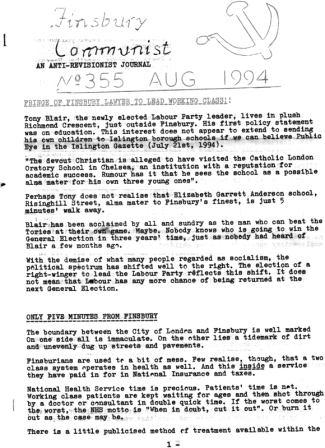
The FCA identified the need for an anti-imperialist and internationalist perspective within the anti-revisionist movement by calling for “complete identification with the cause of the workers and peasants in the colonies and neo-colonies”. It supported self-determination for Ireland, Scotland, Wales, Cornwall and the Isle of Man.
In 1966 the FCA was initially optimistic about the state of the movement: “There are now organised ML groups in most parts of the country and some degree of unity in action has been reached. All that is holding us back from forming a party is the lack of theoretical unity.”
By the 1980s, their enthusiasm had waned. The assessment the FCA gave of the ML movement at the time applied as much to themselves as anybody else:
“Briefly, the Marxist Leninists did not succeed in working out
how they should function in imperialist society; a society which,
for all its inner contradictions. seems likely to continue
for many years yet.”
The results is that the movement is now obviously reduced to a few small groups and individuals, generally without roots anywhere and with not the slightest ideas where they are going. Unity conferences programmes and manifestos become redundant within: a few months, when faced with reality. At times like this it is useful to remember one’s achievements. But these achievements are only in the realm of ideas. Ideas cannot survive outside the human brain. And so the movement has a duty to consider how best it is to survive and grow.” (Finsbury Communist, May 1981)
The FCA’s main complaint about the Marxist-Leninist movement, consistently maintained regardless of who it was criticising, was its ultra-leftism. To prove their point, they emphasized what they characterised as the irrelevance of much ML activity in Britain.
In 1978, for example, the FCA judged that “the British ML movement has two outstanding features at present (1) substantial ignorance of, and disagreement about the actual situation in Britain (2) almost compete ignorance of what to do about that situation.” (Finsbury Communist 161, June 1978)
Despite its longevity the FCA was described by the Communist Workers’ Movement as not being: ”a serious ML organisation; it has never offered much constructive criticism, has concentrated on circulating gossip and producing articles which discredit Marxism-Leninism (struggle against the Albanian line is not helped, for example, by silly remarks about how dusty Albanian bookshops are).” (CWM, Letter to Marxist Industrial Group in 1979)
Others were even less charitable. The Chairman of the RCLB describing the politics of the FCA as “a bourgeois game. They have contempt for the revolutionary struggle of the working class and their organisation is a mere excuse for the most self-indulgent individualism ...Their stand is an insult to and an attack on the cause of building the Revolutionary Party of the working class.” (Letter to Cde. Hickey (CWM) dated 22.2.1979)
Polemics
Classes in Modern Britain by W. B. Bland
Primary Documents
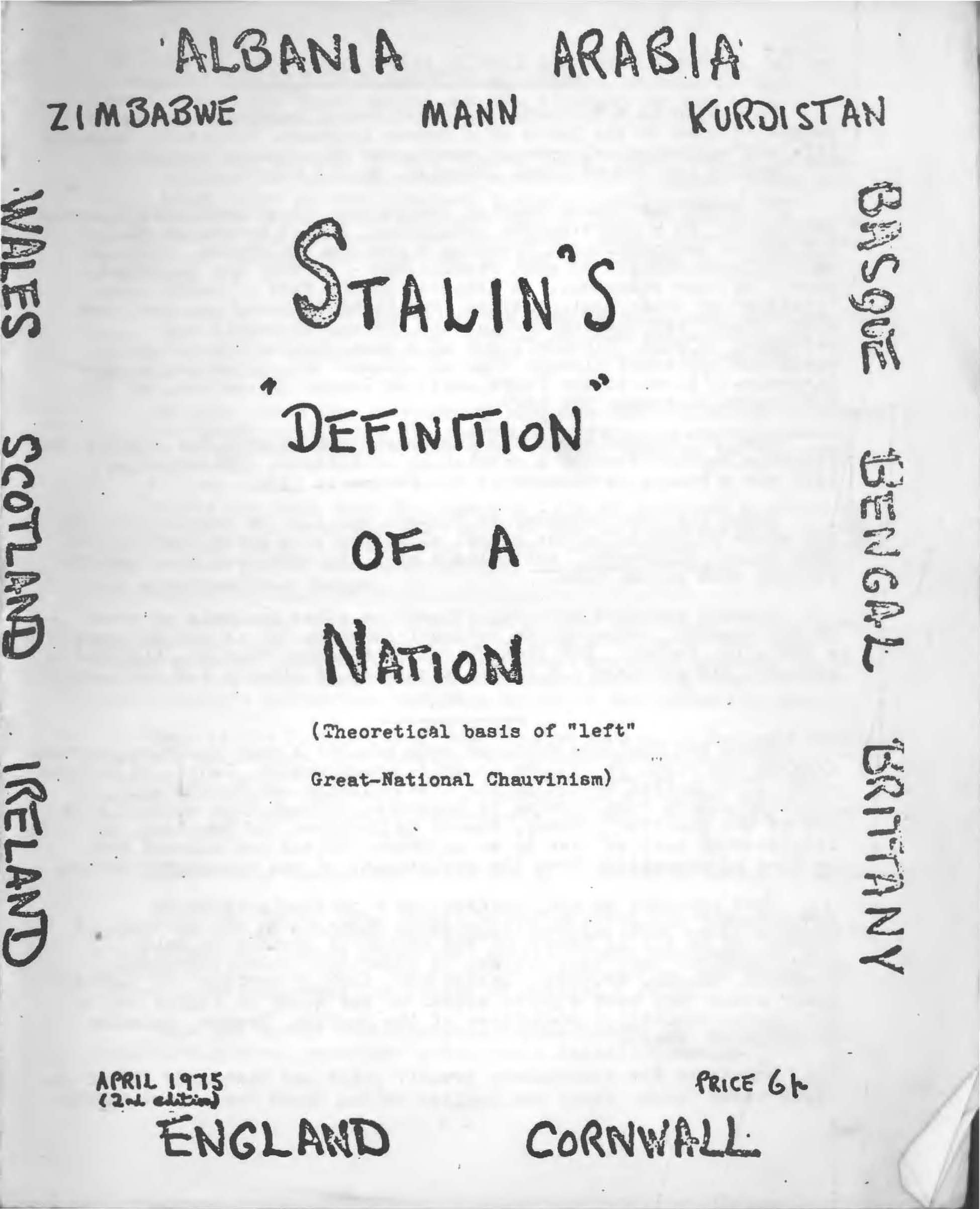
Where to begin
Tea
Stalin’s “Definition” of a Nation (Theoretical Basis of “Left” Great-National Chauvinism)
An Open Letter to the Albanian Party of Labour
The Achievements of the Marxist-Leninist Movement
Ultra-Leftism on the National Question
For ’Virtual Revolution’ – FCA awards Millenium prize!
British Eyewash
Periodical
Selected Issues of the Finsbury Communist, 1980-1995
[Back to top]





















